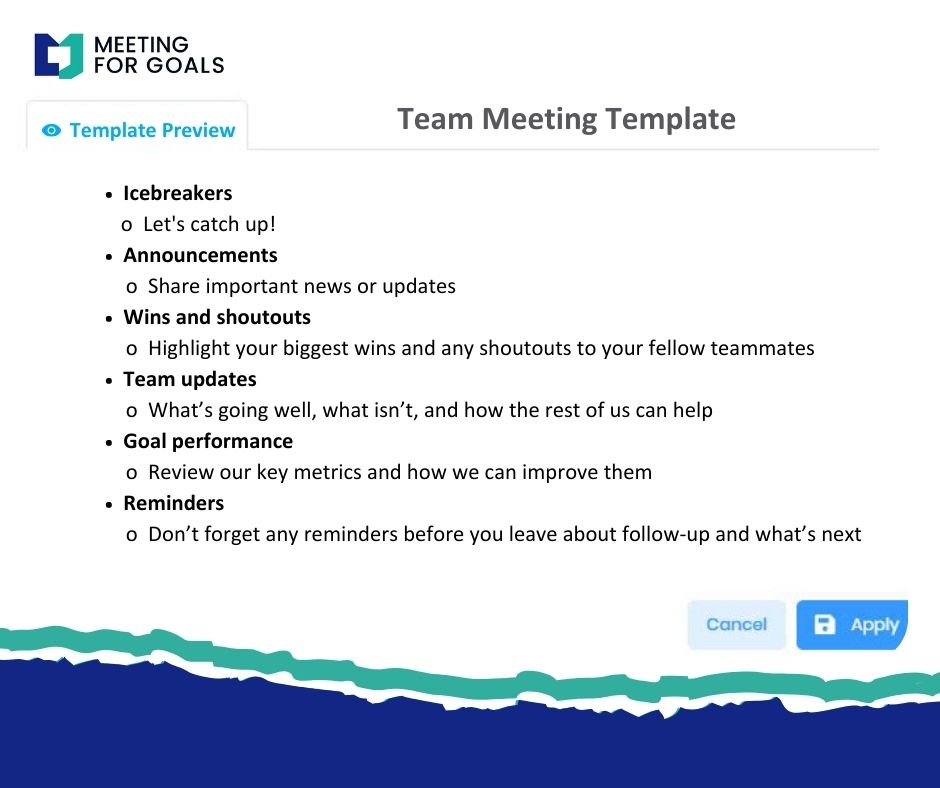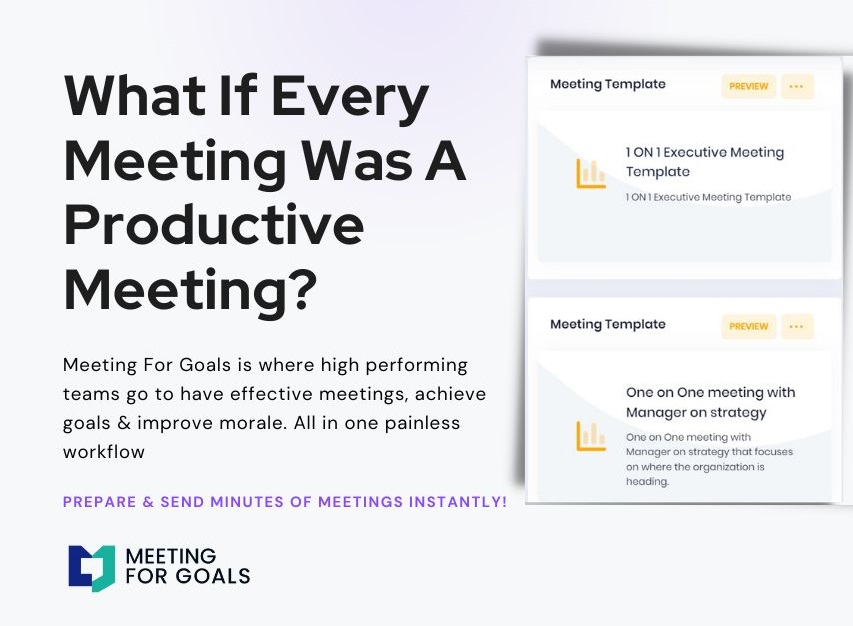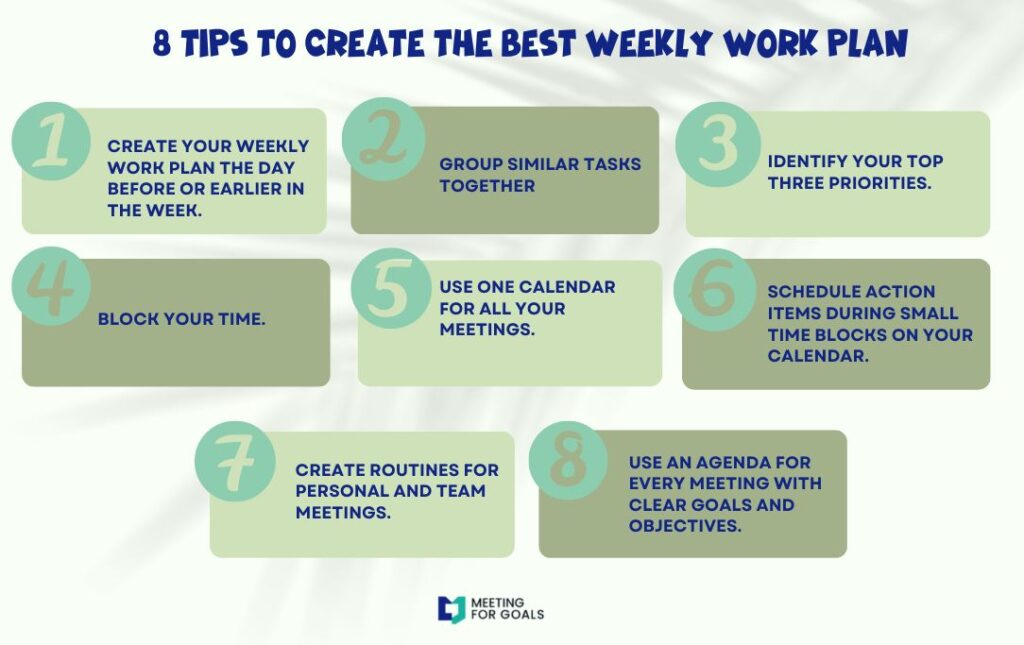Accountability in the Workplace: The Key to High-Performing Teams and Productive Meetings
In today’s fast-paced business world, accountability is more than a buzzword. It’s the foundation of high-performing teams and productive meetings. For growing companies with 40–70 employees, particularly those led by visionary executives, creating a culture of ownership can be the difference between thriving and just surviving.
In this article, we’ll dive into how accountability boosts performance. We will look at how it strengthens morale, improves collaboration, and how tools like Meeting For Goals can help you embed accountability into every meeting and interaction.
I. Introduction
Accountability in the workplace means individuals and teams take ownership of their actions, decisions, and results. It involves:
- Keeping promises
- Being transparent about progress
- Owning both successes and failures
For companies with 40–70 employees, accountability is critical. These businesses often grow quickly and need clarity, consistency, and momentum to scale effectively.
High-performing teams don’t happen by accident. They’re built on:
- Trust
- Communication
- Accountability
When everyone understands what’s expected and how their work ties into bigger goals, they’re more engaged and effective.
For leaders—Directors, VPs, and C-suite executives—setting expectations is only half the battle. The real challenge lies in ensuring those expectations are met. That’s where Meeting For Goals comes in. Our meeting management tool helps:
- Align meetings with company goals
- Assign responsibilities
- Track progress
Want to see how it works? Start with our free, customizable meeting templates to run more focused, goal-driven meetings.
In this article, we’ll explore the benefits of accountability. We will also look at how to build a culture that supports it, the tools that make it stick, and how to overcome common roadblocks. Whether you’re looking to improve your meetings or boost team performance, accountability is the lever that can move your business forward.
2 Minute Video
Watch a 2 minute demo of our meeting management software in action
II. The Benefits of Accountability
Accountability isn’t just about checking boxes or micromanaging people. It’s about creating a culture where everyone is empowered to do their best work and take ownership of outcomes.
A. Improved Performance and Productivity
When people know what’s expected of them, they can focus on what matters most. Clear expectations reduce confusion. This clarity helps teams stay aligned with company goals.
- Accountable employees don’t wait to be told what to do.
- They take initiative, solve problems, and keep things moving.
This proactive mindset boosts productivity across the board. According to a study by the American Society of Training and Development, people are:
- 65% more likely to meet a goal after committing to someone else
- 95% more likely if they have ongoing check-ins
That’s the power of structured accountability. With Meeting For Goals, you can:
- Assign tasks during meetings
- Set deadlines
- Track follow-ups, all in one place
B. Enhanced Team Dynamics
Accountability builds trust. When team members consistently follow through, they earn credibility with each other. This trust leads to:
- Better collaboration
- Smoother communication
Defined responsibilities also reduce conflict. When everyone knows who’s doing what, there’s less finger-pointing and more teamwork. Regular follow-ups and transparent updates help keep everyone on the same page. No more “I thought you were handling that” moments.
C. Greater Employee Engagement and Morale
When people feel responsible for their work, they care more about the outcome. They’re:
- More motivated
- More engaged
- More likely to go the extra mile
Employees want to know their work matters. Accountability helps them see the direct impact of their contributions. And when leaders recognize and reward follow-through, it creates a positive feedback loop:
- People feel appreciated
- Morale improves
- Performance goes up
At Meeting For Goals, we’ve seen how structured accountability transforms team culture. By aligning meeting agendas with goals and assigning clear action items, our software helps teams stay focused and motivated.
Adding an Agenda
How to add an agenda instantly on Meeting For Goals
III. Establishing a Culture of Accountability
Accountability doesn’t just happen. It has to be built intentionally. For growing companies, establishing this culture early creates a strong foundation for long-term success.
A. Leadership’s Role in Modeling Accountability
Leaders set the tone. When executives:
- Own their decisions
- Admit mistakes
- Follow through on commitments
This sends a powerful message. Start by setting clear goals. Make sure everyone knows what success looks like and how their role contributes. Then, lead by example. Use meetings to:
- Assign responsibilities
- Review progress
- Hold yourself accountable too
Meeting For Goals makes this easy by turning every meeting into a structured, transparent conversation about goals and ownership.
B. Training and Development
Accountability is a skill. And like any skill, it can be taught and strengthened. Offer training on:
- Goal-setting
- Time management
- Communication
These basics go a long way in helping employees take ownership of their work. Workshops and coaching sessions can also help. Use real-life scenarios to practice accountability conversations and problem-solving.
Don’t forget about feedback. Regular one-on-ones and check-ins give employees a chance to reflect, ask questions, and grow.
C. Emphasizing Transparency and Openness
Transparency is the fuel that drives accountability. When goals, tasks, and progress are visible, people feel more connected and responsible.
Use weekly check-ins, dashboards, or team huddles to keep everyone aligned. The key is consistency. And when things go wrong, don’t point fingers. Instead, treat mistakes as learning opportunities. A safe environment encourages:
- People to speak up
- Take risks
- Improve
Meeting For Goals supports transparency by providing a centralized space for tracking goals and tasks. Everyone knows what’s happening, who’s responsible, and what’s coming next. Want to start building this culture today? Sign up for Meeting For Goals and see how easy it is to bring structure and accountability to every meeting.
IV. Tools and Strategies to Enhance Accountability
Having the right mindset is important. However, having the right tools and strategies makes it easier to put accountability into action—especially during meetings.
A. Utilizing Meeting Management Software
Meetings are where accountability starts. But too often, they’re unproductive, unfocused, or forgotten the moment they end. Meeting For Goals changes that. Our platform helps you run meetings that actually lead to results with features like:
- Goal-aligned agendas to keep meetings focused
- Real-time task assignments so everyone leaves with clarity
- Automatic summaries and follow-up reminders
- Integration with your favorite tools like Slack and Google Calendar
You’ll never lose track of action items again. Every meeting becomes a step forward—not a time drain.
B. Setting SMART Goals
SMART goals—Specific, Measurable, Achievable, Relevant, and Time-bound—are a proven way to drive accountability. They turn vague ideas into clear, actionable steps. For example:
- Instead of saying “Improve marketing,” a SMART goal would be “Increase email open rates by 20% over the next 3 months.”
SMART goals help people:
- Stay focused
- Remain motivated
- Track progress and celebrate wins
Use Meeting For Goals to set and review SMART goals during your meetings. It’s a simple way to keep your team aligned and accountable.
C. Encouraging Peer Accountability
Accountability doesn’t have to come only from managers. Peer accountability, where team members hold each other responsible, can be just as powerful.
Create:
- Shared dashboards where everyone can see each other’s progress
- Accountability partners
- Team check-ins where people share updates and support each other
When people know their teammates are counting on them, they’re more likely to follow through. Meeting For Goals promotes peer accountability by making goals and tasks visible to the whole team. Everyone knows what’s expected—and who’s doing what.
V. Overcoming Barriers to Accountability
Even with the best intentions, accountability can be hard to maintain. Let’s look at some common barriers and how to overcome them.
A. Identifying Common Challenges
Fear of failure is significant. If employees worry they’ll be punished for mistakes, they may avoid taking ownership altogether. Other issues include:
- Unclear expectations
- Lack of follow-up
If roles and responsibilities aren’t defined, it’s hard to hold anyone accountable. Additionally, lack of follow-up can lead to frustration, missed deadlines, and low morale.
B. Strategies to Mitigate These Challenges
To reduce fear, create a safe space. Encourage open conversations. Let people know it’s okay to make mistakes—as long as they learn from them.
Be crystal clear about expectations. Use:
- Job descriptions
- Project plans
- Meeting notes
These tools can clearly outline who’s responsible for what. And most importantly—follow up. Review action items regularly. Celebrate wins. Offer support where needed.
Meeting For Goals helps with all of this. Our platform keeps tasks visible, deadlines clear, and conversations focused. It’s like having a built-in accountability coach for your team.
Want to explore how to structure your meetings for better follow-up? Check out our free meeting templates for inspiration.
VI. Conclusion
Accountability is more than just a buzzword. It’s the secret sauce behind high-performing teams and productive meetings. When employees take ownership, understand their goals, and feel supported, amazing things happen:
- Productivity rises
- Morale improves
- Collaboration gets easier
Meetings are the heartbeat of this culture. They’re where goals are set, tasks are assigned, and progress is tracked. With Meeting For Goals, you can turn every meeting into a driver of action. Our software helps you:
- Align meetings with company objectives
- Assign responsibilities
- Keep everyone on track—without the headaches
For companies with 40–70 employees, particularly those led by ambitious leaders, Meeting For Goals is a game-changer. It brings structure, clarity, and accountability to your team’s most important conversations.
Ready to build a culture of accountability that drives results?
- 👉 Sign up now and start your journey toward more productive meetings and high-performing teams: Sign Up
- 👉 Want a head start? Explore our free meeting templates and start running better meetings today: Explore Templates
- 👉 Learn more about how Meeting For Goals can help your team thrive: Learn More
External Resources:
- Learn more about the benefits of accountability in the workplace from Harvard Business Review: Harvard Business Review
- Explore the science behind goal-setting and accountability from the American Psychological Association: American Psychological Association



